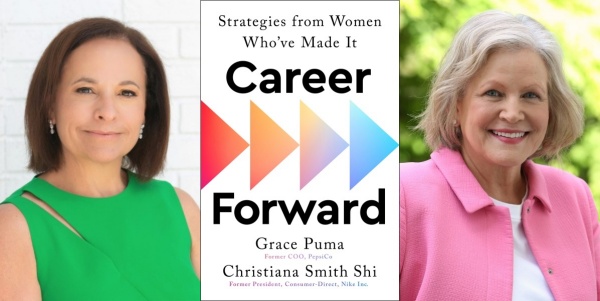Grace Puma and Christiana Smith Shi, co-authors of Career Forward: Strategies From Women Who’ve Made It, have a suggestion for young women: ask not what they can do for their company — ask what they can do for themselves.
It might be surprising advice from two former Fortune 500 execs: Puma was COO of PepsiCo and Smith Shi was the president of Nike’s consumer direct division. They spoke with b. about the importance of prioritizing a career over any one job.
Can you expand on the idea of thinking of yourself as a “growth stock”?
Puma: I think it’s been a very powerful tool in our careers. When you think about a growth stock company, it comes from investment in the right things. It comes from being able to have consistent top performance or contribution back to your shareholders. It comes from innovation, and it comes from taking some degree of risk …
For me, that was working in different industries. That didn’t just happen. Strategically, I learned valuable things in terms of, how do you maneuver different cultures? How do you learn different practices? How do you work in very different businesses, from consumer products to technology to an airline? Whatever it is for you, it’s important to think, “How do I grow?”
Smith Shi: If you’re performing, if people see you delivering in your current role, if people see you interested in trying new things, they will invest their time in you. That’s how you get mentors, because they want to put their time where they’re going to get a good return.
b.: How does Career Forward advise women to strategize around inevitable office politics? People who don’t necessarily deliver, but they appear to get more recognition because they’ve formed relationships with the “right” people?
Smith Shi: We call those kinds of people — and there are women and men like this — we call them “shiny pennies.” … When I was working with a shiny penny, we were doing a project together, and he was getting a lot of the limelight, but I was doing a lot of the work. What I realized was, I needed to up my game in terms of how I was contributing to the discussions in the room. That was good for my career for me to learn that. Better early than later.
Eventually, he flamed out because he didn’t deliver. When it comes down to it, you either put numbers on the board or you don’t. Some of it is a little bit of a waiting game — but learning while you wait.
b.: You start out by talking about how you’d like to impart ideas to younger generations. How do you reconcile the long-term career strategy that worked for you two with the current mentality you see on TikTok?
Smith Shi: The No. 1 loyalty you should have is to yourself and to your potential. I think that fits very well with the mindset that you’re talking about. We’re not saying, “Don’t be supportive of your company.” We’re not saying, “Don’t do the right things for your employer.” We are saying that you are in charge of your career, and you’re going to have to do the right thing [for yourself] sometimes, even if it’s hard.
This interview has been edited for length. Read the full Q&A at business.com.








.png)
.jpg)